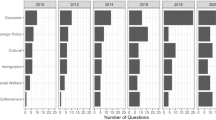Abstract
Poverty is related to, yet distinct from, inequality. Inequality is unevenly distributed across social groups, geography, gender and age cohorts, resulting in regional imbalance across states and regions within states and causing concentration of poverty in certain social groups, gender and age cohorts. National Rural Employment Guarantee Programme is a flagship poverty elimination programme, which should essentially address both poverty and inequality at both interpersonal and regional levels. But does a rights-based, demand-driven, universal workfare programme having self-selection paradigm address poverty and regional imbalance in practice? This question requires to be thoroughly examined to draw policy lessons.

Source Author’s construction based on information sourced from MORD portal. Poverty estimates from 2011 (Tendulkar Committee Estimates)

Source Constructed by the authors based on the information sourced from the MGNREGA web portal of MORD
Similar content being viewed by others
References
Besley, Timothy, and Stephen Coate. 1992. Workforce Versus Welfare: Incentive Arguments for Work Requirements in Poverty-Alleviation Programmes. The American Economic Review 82 (1): 249–261.
Bhalla, Surjit. 2012. No Proof Required: Corruption by any other Name. Financial Express, 4th February.
Imbert, C., and J. Papp. 2015. Labour Market Effects of Social Programmes: Evidence from India’s Employment Guarantee. American Economic Journal: Applied Economics 7 (2): 233–263.
Karat, B. 2016. Retaining MGNREGA’s core. The Hindu, 09 September 2016, Bangalore.
Kumar, Pramod, and I. Maruthi. 2011. Impact of NREGA on Wage Rate Food Security and Rural Urban Migration. Karnataka Institute of Social and Economic Change, Bangalore, May.
Lipton, Michael, and Martin Ravallion. 1995. Poverty and Policy. In Handbook of Development Economics Volume 3, eds. Jere Behrman and T. N. Srinivasan, Amsterdam: North-Holland.
Mukherjee, Dilip. 2014. MGNREGA: Populist leaky bucket or successful anti-poverty programme? Ideas for India. https://www.ideasforindia.in/topics/poverty-inequility/mnrega-popilist-leaky-bucket-or-successful-anti-poverty-programme? Visited on 29 June 2019.
Mukherjee, Anindita. 1997. Public Works Programmes: Some Issues. Indian Journal of Labour Economics 40 (2): 289–306.
O’Keefe, Philip. 2005. Workfare Programmes in India and Internationally: Note on Issues and Experience. New Delhi: World Bank.
Ravallion, Martin. 1991. Reaching the Rural Poor Through Public Employment: Arguments, Evidence and Lessons from South Asia. World Bank Research Observer 6: 153–175.
Ravallion, M. 1998. Appraising Workfare Programmes, World Bank, No. Pov-102, September 1998, Washington, DC.
Ravallion, Martin. 2012. Corruption in the MGNREGs Assessing an Index. Economic and Political Weakly 47 (8): 13–15.
Kumar, Sanjiv, and S. Madheswaran. 2019a. Social Audit of MGNREGA—A Panacea or a Placebo? Issues and Ways Forward in Karnataka. ISBN 978-81-942744-3-8. Working Paper 457, ISEC, 2019.
Kumar, Sanjiv, and S. Madheswaran. 2019b. MGNREGA Ombudsman a Forlorn Scarecrow: Issues and Ways Forward in Karnataka. ISBN 978-81-942744-6-9. Working Paper 460, ISEC, 2019.
Kumar, Sanjiv, and S. Madheswaran. 2020a. Information Asymmetry, Exclusion and Inclusion Errors and Elite Capture of MGNREGA: Critical Examination of IEC Strategies in Karnataka and Ways Forward. Institute of Social and Economic Change as a Working Paper of ISEC.
Kumar, Sanjiv, and S. Madheswaran. 2020b. MGNREGA Quality Monitoring and Multiplier ‘Malai’ For the Richer States: Evidence on Elite Capture of Assets and Ways Forward. Under Process of Publication as a Working Paper of ISEC.
Subbarao, K. 1997. Public Works as an Anti-Poverty Programme: An Overview of Cross-Country Experience. American Journal of Agricultural Economics 79: 678–683.
Subramanian, K.V. 2019. Economic Survey 2018–2019. Ministry of Finance: Government of India.
Zimmermann, L. 2012. Jaiho! The Impact of a Large Public Works Programme on the Government Election Performance in India, Working Paper, Department of Economics, University of Michigan.
Author information
Authors and Affiliations
Corresponding author
Additional information
Publisher's Note
Springer Nature remains neutral with regard to jurisdictional claims in published maps and institutional affiliations.
Rights and permissions
About this article
Cite this article
Kumar, S., Madheswaran, S. & Vani, B.P. Ad Hoc Rationing, Capacity Bias, Information Asymmetry and Elite Capture of MGNREGA in Karnataka: Policy Perspectives on Poverty and Regional Balance. Ind. J. Labour Econ. 63, 741–763 (2020). https://doi.org/10.1007/s41027-020-00289-4
Accepted:
Published:
Issue Date:
DOI: https://doi.org/10.1007/s41027-020-00289-4




